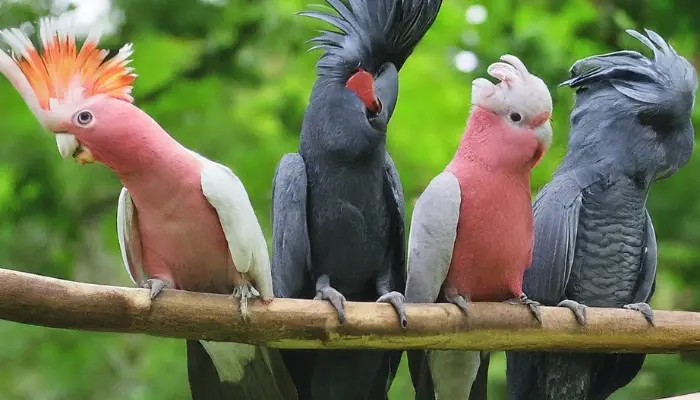Cockatoos are a group of parrots belonging to the family Cacatuidae. They are easily recognizable by their distinctive crests and curved bills. There are 21 species of cockatoos native to Australia, the Philippines, eastern Indonesia, and nearby islands. They exhibit a range of colors from the white plumage of the Sulphur-crested Cockatoo to the black feathers of the Palm Cockatoo. Cockatoos are highly intelligent and social birds known for their ability to mimic sounds and their playful and affectionate nature.
Understanding the diet of cockatoos is important for both pet owners and wildlife enthusiasts. For pet owners, a proper diet keeps cockatoos healthy and prevents issues like feather plucking, obesity, and organ failure. It also ensures their mental well-being and prevents problems like aggression and self-mutilation. A balanced diet with seeds, pellets, fruits, vegetables, and occasional nuts helps mimic their natural foraging behavior.
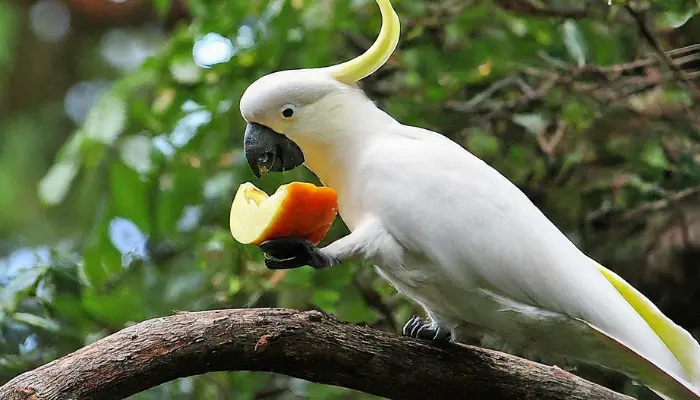
What Fruits Can Cockatoos Eat?
Cockatoos can enjoy a variety of fruits that provide essential nutrients and contribute to their overall health. Here is a detailed list of fruits that are absolutely safe for cockatoos.
Apples
Cockatoos enjoy apples, which are packed with essential nutrients. However, always remove the seeds, as they are harmful.
Blueberries
Blueberries rank high among their favorites. Their vibrant color, juicy texture, and delicious taste make them highly appealing. Blueberries are excellent for improving eyesight and supporting growth.
Grapes
Soft and juicy grapes are another favorite for cockatoos. They help prolong their lifespan and maintain healthy blood pressure.
Cucumbers
Cucumbers, including their seeds, are safe and edible for cockatoos. They aid in wound healing and hydration, making them a frequent treat.
Strawberries
Strawberries, like other berries, are a hit with cockatoos. Rich in vitamins and minerals, they support brain cell function. Due to their sweetness, they should be offered sparingly.
Bananas
Bananas, containing tryptophan, help keep cockatoos happy. Almost all parts of the banana, including the peel and leaves, are safe for them.
Mangoes
Mangoes are a delight for cockatoos, providing essential nutrients that help reduce self-destructive behaviors like feather plucking.
Oranges
Oranges, rich in vitamin C, are great for cardiovascular and intestinal health. Cockatoos enjoy the fibrous and juicy pulp.
Pineapples
Pineapples should be given in moderation due to their sweetness. Fresh pineapples boost immunity against fungal infections, but avoid canned versions with harmful additives.
Pomegranate
Pomegranate is one of the most nutritious fruits for cockatoos, promoting healthy skin and feathers and reducing feather plucking tendencies.
Watermelons
Highly active cockatoos benefit from the hydration and energy watermelons provide. This juicy fruit supports heart and lung health.
Pears
Like apples, pears are nutritious but their seeds should be removed before feeding as they can be toxic.
Kiwi
Kiwis help maintain blood sugar levels and aid digestion. It’s recommended to serve kiwi with other fruits for a balanced diet.
Pumpkin
Cockatoos can eat all parts of the pumpkin. Rich in Omega 3 and Omega 6 fatty acids, pumpkins help regulate blood pressure.
Cantaloupe
Similar to pumpkins, cantaloupes offer benefits like strengthened immunity and regulated sugar levels. This melon variety is a nutritious choice.
Peaches
Peaches are enjoyed by cockatoos, but the pit must be removed as it is toxic.
Plums
Plums are nutritious but should be offered in moderation and the pit should be removed to avoid toxicity.
Papayas
Rich in vitamins, papayas are a healthy choice. The seeds are safe in small amounts and can provide additional nutrients.
Incorporating a variety of these fruits into your cockatoo’s diet ensures they receive a balanced and nourishing diet that supports their overall health and well-being. Always remember to wash the fruits thoroughly remove any toxic parts like seeds and pits and serve them in moderation alongside other balanced food options.
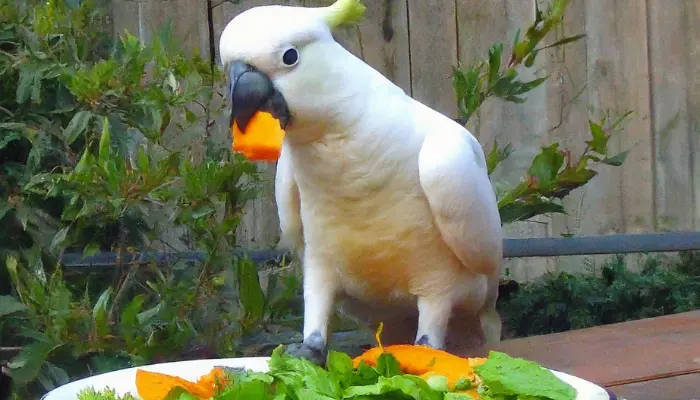
What Vegetables Can Cockatoos Eat?
Cockatoos can safely eat a variety of vegetables which provide essential vitamins, minerals, and fiber necessary for their health. Some suitable vegetables for cockatoos include.
Leafy Greens
Spinach, kale, Swiss chard, and romaine lettuce are excellent sources of vitamins A, C, and K. These leafy greens should be a regular part of your cockatoo’s diet to ensure they get the necessary nutrients.
Cruciferous Vegetables
Broccoli, cauliflower, and Brussels sprouts offer a good amount of fiber, vitamins, and antioxidants. These vegetables can help boost your cockatoo’s overall health and are usually enjoyed by them.
Root Vegetables
Carrots, sweet potatoes, and beets are rich in vitamins and minerals. It’s best to cook sweet potatoes to make them easier to digest. Root vegetables are beneficial for their bones and improve bowel movement.
Squash
Zucchini, yellow squash, and butternut squash are nutritious and enjoyed by many cockatoos. They provide essential vitamins and minerals, making them a great addition to your bird’s diet.
Peppers
Bell peppers (red, green, yellow, and orange) are high in vitamin C and antioxidants. These colorful vegetables are not only nutritious but also attractive and tasty for cockatoos.
Green Beans
Green beans are a good source of vitamins and minerals and are generally well-liked by cockatoos. They can be served raw or lightly steamed.
Peas
Sugar snap peas and green peas provide protein and fiber. They are nutritious and can be a fun, crunchy snack for your bird.
Celery
Rich in fiber and water, celery can be a refreshing snack for cockatoos. However, raw celery can cause intestinal issues, so it’s better to mix its juice with other fruits and vegetables.
Corn
Fresh corn on the cob is a favorite among many birds, including cockatoos. It’s tasty and provides a good amount of vitamins and minerals essential for their health.
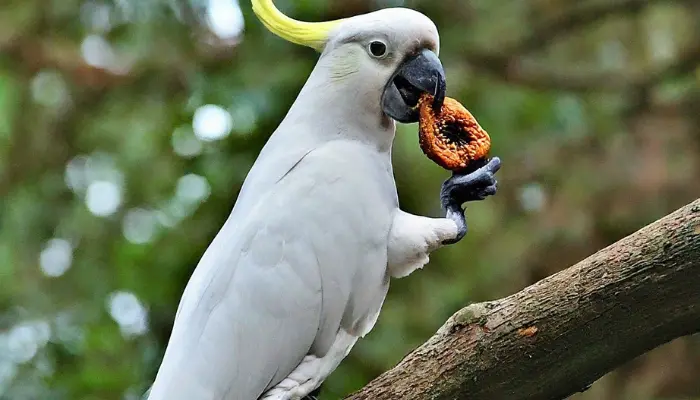
What Kind of Nuts Can Cockatoos Eat?
Cockatoos can enjoy a variety of nuts and dry fruits as part of a balanced diet. Here are some safe and healthy options for them.
Almonds
Raw and unsalted almonds are an excellent source of protein for cockatoos. They provide essential nutrients and should be a part of their balanced diet.
Walnuts
Walnuts are nutritious and contain many vitamins and minerals. Due to their high-fat content, they should be given in small amounts to avoid health issues.
Pecans
Pecans are also high in fat and should be offered sparingly. They provide important nutrients but should be a rare treat to prevent excessive fat intake.
Hazelnuts
Raw and unsalted hazelnuts are a good source of protein and healthy fats. They should be given in moderation to ensure a balanced diet.
Brazil Nuts
Brazil nuts are high in fat and should be given as an occasional treat. They provide selenium and other important nutrients but should not be a regular part of the diet.
Macadamia Nuts
Macadamia nuts are very high in fat and should be a rare treat for cockatoos. While nutritious, they can contribute to weight gain if given too often.
Pine Nuts
Pine nuts are small and easy for cockatoos to eat. They are nutritious and should be given in moderation to avoid excessive fat intake.
Cashews
Unsalted and raw cashews are a good source of healthy fats and protein. They should be given in limited amounts to maintain a balanced diet.
Pistachios
Unsalted and shelled pistachios are rich in protein and vitamins, promoting growth and health in cockatoos. However, they should not be served in excessive quantities to prevent stomach upset.
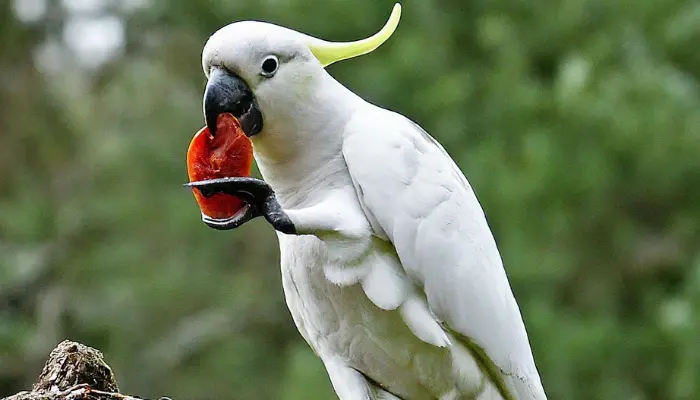
What Kind of Dry Fruits Can Cockatoos Eat?
Cockatoos also love dry fruits. Here are some example of dry fruits that are beneficial for Cockatoos.
Dried Apricots
Dried apricots are a good source of vitamins and fiber. Choose unsulfured and unsweetened varieties.
Dried Figs
Dried figs provide natural sugars and fiber. Ensure they are free of additives and given in small amounts.
Dates
Dates are sweet and should be given sparingly due to their high sugar content. They provide fiber and essential nutrients.
Prunes
Prunes are rich in fiber and beneficial for digestive health. Serve them in moderation and ensure they are unsweetened.
Dried Cranberries
Dried cranberries are beneficial for urinary tract health. Choose unsweetened cranberries and offer them in limited quantities.
By incorporating these nuts and dry fruits into your cockatoo’s diet, you can ensure they receive a variety of nutrients and enjoy a balanced diet. Always introduce new foods gradually and monitor for any adverse reactions.
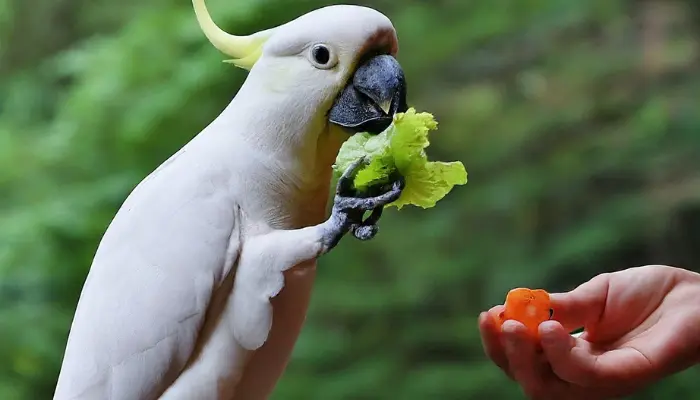
what do cockatoos eat in the wild?
In the wild, cockatoos have a diverse diet that includes various types of foods depending on their species and habitat. Generally their diet consists of.
Seeds and Nuts
Cockatoos are known for their strong beaks, which they use to crack open hard seeds and nuts. They often forage for seeds from various plants and trees.
Fruits and Berries
They enjoy a variety of fruits and berries, which provide essential vitamins and hydration. Common fruits include figs, berries, and other native fruits.
Vegetation
Cockatoos eat green vegetation, including leaves, stems, and flowers. This provides them with necessary nutrients and fiber.
Insects and Larvae
While primarily herbivorous, some cockatoos will occasionally consume insects, larvae, and other small invertebrates to supplement their diet with protein.
Roots and Tubers
They may dig up roots and tubers from the ground, especially in drier seasons when other food sources are scarce.
Bark and Wood
Some species will chew on bark and wood, which not only helps them maintain their beaks but also provides them with additional nutrients.
Different species of cockatoos have variations in their diet based on their specific habitat and availability of food sources. For example, the diet of a Sulphur-crested Cockatoo may differ slightly from that of a Galah or a Palm Cockatoo due to regional differences in flora and fauna.
Conclusion
Cockatoos thrive on a natural diet but should avoid dairy products and foods with artificial sugar as these can be harmful. The best diet for cockatoos includes 20% seeds, 50% vegetables, and 30% fruits. Seeds should be varied, such as sunflower, safflower, and millet, but given in small amounts due to their high fat content.
